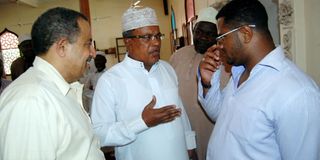Leaders call for peaceful poll

Photo/LABAN WALLOGA
Supreme Council of Kenya Muslims coast chairman Sheikh Mohdhar Khatamy (centre) talks to Mombasa aspirants Suleiman Shahbal (UDF, governor) and Hassan Omar (ODM, senator) in Mombasa where Muslim leaders condemned recent political attacks.
What you need to know:
- Religious leaders call for violence-free poll
Religious leaders and aspirants from various political parties on Thursday united to demand violence-free campaigns in Mombasa county and the Coast region.
In a rare gesture, the leaders closed ranks in their quest to ensure the county is not hit by violence in the run-up to the March 4 General Election.
They called for tough sanctions against those found to be sponsoring chaos during the electioneering period.
The aspirants included Mr Suleiman Shahbal, who aspires to be Mombasa governor on a United Democratic Forum (UDF) ticket, Mr Hassan Omar (Senate aspirant, ODM), Ms Sureya Hirsi (Women representative, Wiper Democratic Party) and Mr Hezron Awiti (ODM parliamentary aspirant, Nyali).
As they addressed a press conference at the Royal Castle Hotel, a group of 100 Muslim leaders meeting at the Jundani Mosque demanded that police act tough on those promoting violence.
Supkem Coast branch chairman Sheikh Shariff Muhdhar Khatamy said Muslims want the Independent Electoral and Boundaries Commission to crackdown on such politicians.
“IEBC should disqualify the perpetrators from vying for any elective position because under the Constitution, it has the powers to do so,” he said. He urged Muslim faithful to thoroughly vet aspirants and elect only those with high integrity and credibility.
Mr Shahbal said cases of political violence were on the rise and revealed that he had already been attacked three times.
Mr Awiti condemned an incident in which he was attacked and injured together with his supporters on Sunday. He was in a convoy led by Prime Minister Raila Odinga during the official opening of an ODM office at Buxton. He said he had reported the matter to the police but no action had been taken.
Mr Omar, a former Kenya National Commission on Human Rights official, said Mombasa was a cosmopolitan county where anyone, irrespective of their ethnic group, religion, party or background was allowed to vie for any seat.
In Kakamega, the Land Development and Governance Institute said politicians should stop using land disputes to incite communities against each other.
The group said Kenyans should reject such politicians.
The lobby said it was unacceptable that land disputes had become tied to the election process.
The institute is involved in the “Ardhi na Amani Kenya,” campaign seeking to promote peaceful co-existence of communities as the country gears up for the elections.
The chairman of the institute, Mr Ibrahim Mwathane and the Executive director Mwenda Makathimo said Kenyans should not accept to be incited against each other on account of land.
Speaking in Kakamega at a meeting attended by government officials, political and religious leaders and other stakeholders, Mr Makathimo said aggrieved parties should let Land Governance institutions established in the Constitution to handle the disputes.
“Such violent flare ups have become cyclic, usually happening before, during or just after General Elections. The land related violence undermines security, economic growth and political stability, said Mr Mwathane.
Western provincial commissioner James ole Seriani said the Government had settled 2,000 people at the Chebyuk scheme in Mt Elgon district.
He said there were nearly 10,000 people who were landless in the district and were being considered for alternative means of earning livelihoods to ease pressure on forest resources.
In Nairobi, a group of NGOs has launched a programme to unite the country by appealing to Kenyans to write down their hopes and aspirations for a better Kenya.
The programme dubbed “write to God” envisages inspiring people to think of the country first, and not their ethnic identities.
The group hopes that by having as many Kenyans as possible engage in the exercise, it would gradually diffuse ethnic tension and identities, and have the people united around greater ideals and break down tribal barriers.




